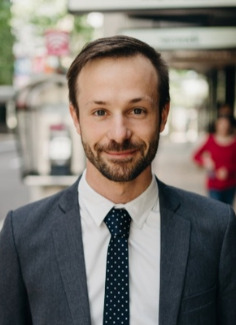Lifestyle
Copyright@ Australian Catholic University 1998-2026 | ABN 15 050 192 660 CRICOS registered provider: 00004G | PRV12008
Copyright@ Australian Catholic University 1998-2026 | ABN 15 050 192 660 CRICOS registered provider: 00004G | PRV12008

When Benjamin Franklin mused, in 1789, that nothing in this world is certain except death (and taxes), he tapped into a topic that all people, like it or not, have a connection with. For many, the process of dying can seem like something terrible. It’s seen as a downward spiral of health – a progressive dwindling that brings much pain and suffering.
But according to bioethicist Xavier Symons, the end of life can also be a time of growth.
In an open access paper titled ‘Flourishing at the end of life’, Associate Professor Symons and his co-authors examine whether dying might present unique opportunities to realise basic human goods.
“A lot of people think about terminal illness in a very negative way, and I get that,” says Associate Professor Symons, director of ACU’s Plunkett Centre for Ethics, whose research explores ethical issues at the beginning and end of life.
“Dying can be quite terrible, and I wouldn’t wish that on anyone – but it does happen. The question that arises is, notwithstanding all the terrible and negative parts of the end of life, is it a distinct time in which we can realise certain human goods in a unique way?”
The dying process often begets an inclination for deeper reflection, nurturing an openness that can bring clarity and closure. In the face of death, people accomplish feats that had previously eluded them – a feeling of peace, a mended relationship, or a greater sense of meaning and purpose.
“When you’re confronted with your own mortality, you tend to become more philosophical and even transcendent in your outlook on life, and that can be a good thing,” says Associate Professor Symons, who was previously a postdoctoral research fellow at Harvard University’s Human Flourishing Program.
“There’s a kind of thawing that can occur of a hardened personality, where people become quite tender and affectionate and are more likely to reconcile with loves ones. Maybe they’re more open to grappling with the big questions: What is the meaning of life? What do I believe in? And how can I find peace at this time?”
For nearly a decade, Xavier Symons has delved into the complexities of death and dying in his bioethical research. But in recent years, his exploration of the topic has taken on a personal dimension.
In 2021, while the world was still in the throes of a pandemic, he lost his father to a heart attack.
“My dad had various health issues,” he recalls, “but his death was still quite sudden and for me, it was obviously a time of grieving, but also of deep reflection on what it means to live well at the end of life.”
This served as a catalyst for him to examine more deeply the idea of dying a good death, and the value of viewing the end of life through a more positive lens.
“I’ve always been a bit troubled by the way that death is a tragedy, because it’s something we all experience,” he says.
“I think there are ways we can reframe terminal illness, and reframe the end of life, so we’re more open to the idea that we can flourish through it.”
He hastens to add that he and his colleagues do not wish to romanticise or glorify the dying process, or the pain and suffering that can accompany it.
“We’re not being naïve about this situation,” says Associate Professor Symons, a former Fulbright Scholar at Georgetown University’s Kennedy Institute for Ethics, a leading bioethics institute. “We acknowledge that terminal illness can sometimes be quite tragic and distressing, where people are forced to face the stark truth that their life is coming to an end, and in many cases the language of flourishing might seem inappropriate in this context.”
At the same time, he and his co-authors argue that there are “certain dimensions of human existence that one can enter into more fully when one’s life is ending”.
“The end of life can be pregnant with meaning and significance for human beings,” the authors write. “We would like to put pressure on an assumption that some might hold – namely, that flourishing is impossible or exceedingly rare in the final chapters of life.”
Before he began to grapple with the question of whether end of life flourishing is possible, Xavier Symons spent time examining the very concept of human flourishing.
He did this during his fellowship at the Human Flourishing Program, a research lab at Harvard’s Institute for Quantitative Social Science that studies and promotes various aspects of human wellbeing and happiness. With a task to put the program on a stronger philosophical footing, he weaved his way through the work of Aristotle, exploring the philosopher’s much-studied concept of eudaimonia.
“For Aristotle, flourishing was focused on rational activity in accord with virtue and character, and that was interesting to me because it wasn’t the first thing that sprung to mind when I started thinking about flourishing and its common usage,” he says.
While human flourishing is a concept with a rich philosophical pedigree, it has recently resurged as a buzzword of sorts. Its contemporary definition tends to denote the vigorous development of a living thing over time, with less focus on the virtuous activity that is central to Aristotelian flourishing.
Nonetheless, Associate Professor Symons sees value in the reintroduction of flourishing into the vernacular.
“I think the language of flourishing has become more commonplace because it’s something we can all get behind,” he says, adding that this is particularly the case in Australia, which holds “an egalitarian sentiment where we want everyone in society to flourish”.

Importantly, he and his co-authors take the position that human flourishing can look vastly different depending on the context. While the classical and conventional ideas of flourishing might be out of reach to older people or those who live with illness or disability, a more nuanced view allows it to be more widely attainable.
“I think we need to be a bit two-dimensional in the way we define flourishing,” he says. “The reality is that it’s going to look different across the course of life, so you need to adjust the criteria for flourishing to suit the life circumstances.”
Despite the many challenges faced at the end of life, Xavier Symons and his colleagues aim to reveal its unique potential for flourishing in three main areas: character growth, deeper social and personal connections, and strengthened meaning and purpose.
In exploring these key themes, they illustrate various ways in which people can flourish through the dying process. They also suggest some activities for families and caregivers – legacy project interventions and relationship counselling, for example – to allow patients to make the most of their dying days.
“You don't necessarily need to be a medical professional to help someone to reflect on the events of their lives and celebrate their legacy, and these can be really useful ways to help people to discover meaning at the end of life,” Associate Professor Symons says.
He points to the website I Am Living, produced by Calvary Health Care, as a useful resource. The site includes a series of articles and vignettes that shed light on the potential pathways to living meaningfully at the end of life.
“The stories are incredibly raw, humane and honest,” he says, “and I see the value of bringing focus on these authentic representations of terminal illness, where among the pain and suffering there’s also a kind of flourishing as people have positive experiences … connecting with loved ones, finding meaning, and just being appreciative of what they bring to the world.”
Given that death and dying is a universal part of the human experience, Associate Professor Symons hopes to encourage more open conversations, helping to break down one of society’s most persistent taboos.
“At some point we need to come to terms with the fact that there some things in life, like death and taxes, that are inevitable,” he says. “Maybe then we can start to talk more about what it means to cultivate virtue and other good moral dispositions, and to consider what role that might play not only in living a good life, but also dying a good death.”
Associate Professor Xavier Symons is the Director of ACU’s Plunkett Centre for Ethics, located on the campus of St Vincent's Hospital in Sydney. He has worked as a bioethicist for several years, and has collaborated with the Catholic healthcare sector on many projects related to healthcare ethics.

Copyright@ Australian Catholic University 1998-2026 | ABN 15 050 192 660 CRICOS registered provider: 00004G | PRV12008